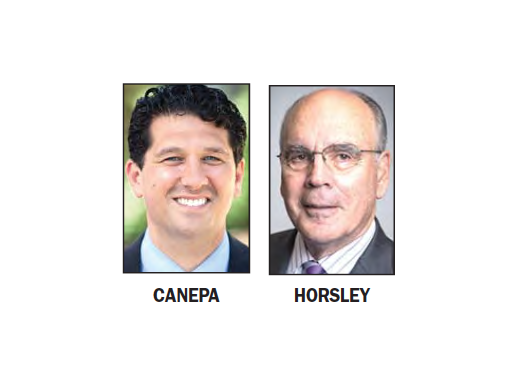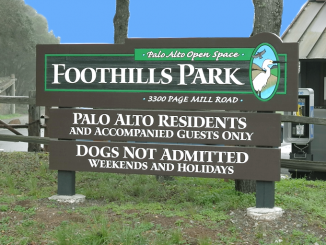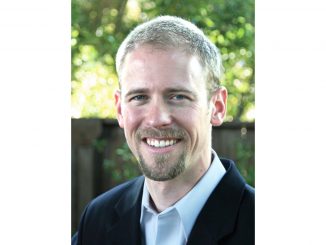
BY EMILY MIBACH AND ALLISON LEVITSKY
Daily Post Staff Writers
Two San Mateo County supervisors are proposing that the board approve a resolution that supports the divisive Senate Bill 50, which would give the state the right to override city zoning to allow developers to build high-density housing projects in certain areas.
If the rest of the five-member board signs on to supervisors David Canepa and Don Horsley’s resolution, it would make the San Mateo County Board of Supervisors one of the first elected entities in the area to support the bill, which was proposed by Sen. Scott Wiener, D-San Francisco, in December.
Canepa, who represents much of north San Mateo County (Daly City, Colma, Brisbane and parts of San Bruno and South San Francisco), said it became apparent to him that a housing solution was needed when he began to see campers throughout his district.
“People are living in housing that is inadequate or unacceptable,” Canepa said. “We can’t have 10 to 14 people living in a house and still trying to scrape by.”
Canepa acknowledged that his position on the bill probably won’t be popular, but said that now is the time to add housing to the area. The bill, Canepa said, would jump-start the cities that are some 500 years away from hitting their housing goals, as was stated in the report “Missing the Mark: Examining the Shortcomings of California’s Housing Goals.”
The report was produced by Next 10, a nonpartisan organization that looks at the state’s economy, environment and quality-of-life issues.
“When we look at this bill, we have to (acknowledge) that it’s for the greater good,” Canepa said.
On the other side of the aisle is the newly formed Embarcadero Institute, a nonprofit funded by slow growth activists in Palo Alto.
46,000 more housing units
The institute released a report Wednesday warning that SB 50 would add an additional 46,000 housing units in areas of Palo Alto that are along a high-quality transit corridor or within a half-mile of a major transit stop such as a Caltrain station.
Those include parts of the Downtown North, University South, Professorville, Old Palo Alto, Midtown, Evergreen Park, Mayfield, Ventura, Greenmeadow, Monroe Park, Southgate, College Terrace and Barron Park neighborhoods.
That would almost triple Palo Alto’s population, adding 90,000 vehicles and 30,000 school-age children to the city. The city’s current population is 67,000.
“The question remains as to where investment dollars will come from to support the new transportation, education and community services needed to support this growth,” the 17-page report states, despite the fact that residential development generates the property tax that funds the Palo Alto school district.
SB 50 would essentially eliminate single-family residential zoning in Palo Alto, making apartment buildings legal throughout neighborhoods that allow housing. It would also lower the number of parking spaces required to accompany housing. Within a half-mile of a Caltrain station, no parking would be required, and elsewhere in the city, only one space per two units would be required.
The report claims that this lack of parking would endanger pedestrians and cyclists by leading to more curb parking.
Concerns about SB 50 expressed in the report are common among elected officials on the mid-Peninsula.
Palo Alto Mayor Eric Filseth even took the opportunity to rail against SB 50 at his State of the City address on Monday.
Councilwoman Liz Kniss said many people, including top city employees, were surprised at how political Filseth’s speech was.
Kniss ‘stunned’ by report
And Kniss said she was “stunned” by the report.
“I guess I would frankly say it’s another attempt by those of means in our community to attempt and influence outcomes of different policies and legislations,” Kniss said. “I had never heard of the Embarcadero Institute, and learned that it was apparently funded by the same five families that have gotten very involved in the races.”
On the board are Gab Layton, Planning Commissioner Asher Waldfogel, Santa Clara County Human Relations Commission Vice Chair Greer Stone and Irene Au.
Also involved is slow-growth newsletter editor-in-chief Jennifer Chang Hetterly.
“The whole group at City Hall was pretty stunned,” Kniss said of the report. “It is really, um, it kind of takes your breath away.”
Kniss said she doesn’t typically take a position on legislation this early, but would rather work with Wiener on the bill “rather than fighting it tooth and nail from the very beginning.”
“There are parts of it that I think are admirable,” Kniss said. “My problem with all of this is that you simply cannot address housing without addressing transportation, and that’s the bottom line for me. Otherwise, you’ve got kind of a crazy situation where you’ve got tons of housing and nobody can get anywhere they want to go.”




What stuns me is that Liz Kniss has a shred of credibility left to her name. For decades she as used political skills to portray herself as a centrist but voted with business at every opportunity. And the fact that she denied Palo Alto had traffic issues last August was almost surreal. Any update on her campaign finance violation from two years ago?
finally, San Mateo may well start doing its fair share of housing all the jobs they create(d) but pushed off housing them to SF and east bay and further, creating this housing crisis and murderous commutes over the bridges and highways to get to work there.
The item was dropped from the March 12 agenda of the San Mateo Board of Supervisors and is not on the next March 26) agenda. But I hope to visit Supervisors at the start of their March 26 9am meeting to use two minutes (under ORAL COMMUNICATIONS) to warn about SB 50. Join me.
Correction: The matter of supporting SB 50 was NOT dropped from the March 12 agenda. It was tabled at the meeting on the motion of Supervisor Horsley who perhaps figured out that Supervisor Canepa may just be looking to follow in the footsteps of State Senator Scott Wiener (a former county supervisor in San Francisco). It costs a lot of money to run for State Assembly or State Senate. That money comes from special interest groups such as housing developers and high-tech corporations.